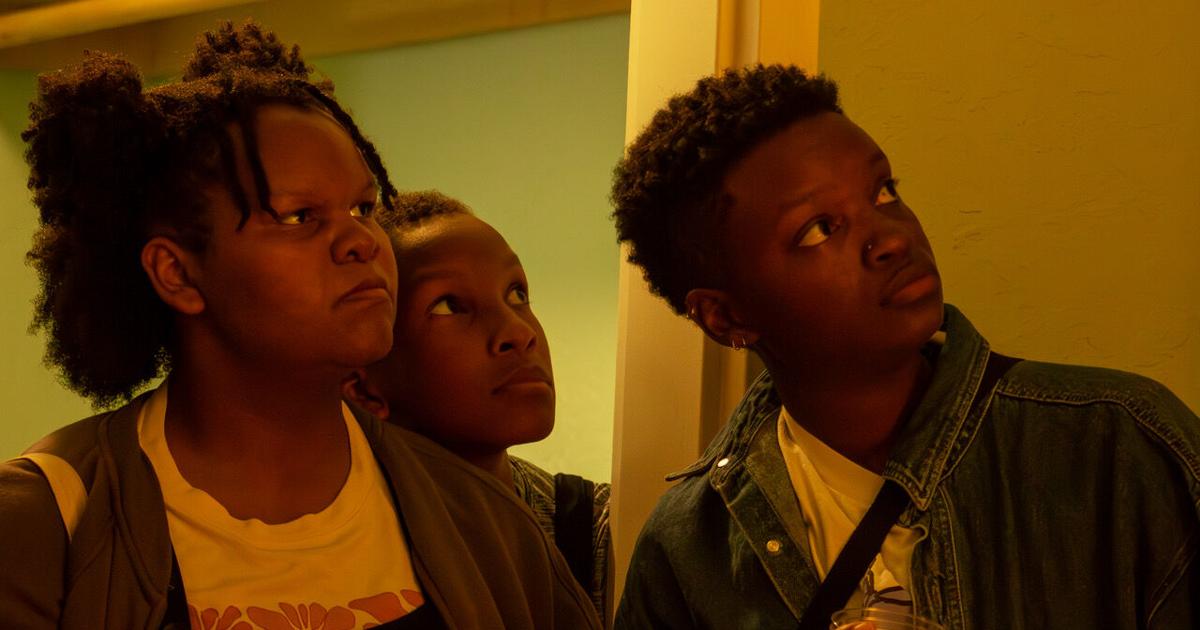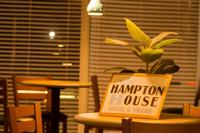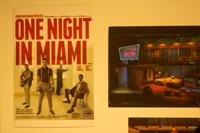On a breezy Friday night in the community of Brownsville, film lovers from South Florida to Quebec, Canada, came together for an evening of history, art and culture that brought Miami’s Black heritage to life.
The event at the Historic Hampton House, held in partnership with Video Consortium, celebrated Miami’s Black history through a screening of three 16mm short films curated by Miami archivist and librarian Katharine Labuda. These films included The Matter with Me (1971), Didn’t We Ramble On (1989), and A Few Things I Know About Miami (1987).
“We are lucky in Miami to have the 16mm Film Collection at the public library, but we also have the Wolfson Moving Image Archive at Miami Dade College,” said Labuda. “In a city that changes its physical form so quickly, it can be hard to connect the past and the present. These archives give us a visual portal that can help make sense of how our city has evolved.”
Katharine Labuda, a film archivist and librarian, introduces the film screening at the Historic Hampton House.
(Elisabeth Campbell for The Miami Times)
As the only Green Book museum in the world and one of the few remaining Green Book sites from the Jim Crow era, the Historic Hampton House is both a treasure trove of the past and a cultural arts center that has opened new avenues for the exploration of social justice and human rights.
Built in 1954, the Hampton House Motel was a two-story, 50-room, modernist-style inn. Following a migration of the prominent members of Brownsville’s Black community to other Miami neighborhoods as a result of desegregation, the Hampton House eventually closed in 1976. In 2015, the Historic Hampton House Community Trust began a $6 million restoration of the site. The House is now a cultural center and important landmark of Brownsville, whose population is still predominantly Black.
The Historic Hampton House is one of few remaining Green Book locations of the Jim Crow era.
(Elisabeth Campbell for The Miami Times)
After the screening of the three short films, a discussion with acclaimed Miami documentary filmmaker Dudley Alexis, known for When Liberty Burns and Edge of Hope, took viewers on a journey beyond the screen to Miami’s layered cultural past.
Alexis emphasized the importance of Black representation in film for authentic storytelling, arguing that Black filmmakers should tell their own stories to avoid misrepresentation. He called attention to the diverse experiences within the Black community, comparing perspectives from different regions.
Muhammad Ali celebrated his win in Miami Beach in 1964 at the Historic Hampton House, then the Hampton House Motel, with his friend Malcolm X.
(Elisabeth Campbell for The Miami Times)
“We cannot let other people shape our narrative,” said Alexis. “I like to give the example of a script. You give it to a director that grew up in the northeast, you get a story that’s different from a director that grew up in the South. I love the diversity of Black people. All of our experiences are different.”
Alexis also discussed the role of art in communication and cultural understanding, using film as a tool to shape narratives. He identifies as a cultural anthropologist, exploring diverse cultures and histories, and stresses the need for Black filmmakers to include Black narratives in the story of Miami.
Attendees filled Muhammad Ali’s former motel room during a tour of the Historic Hampton House.
(Elisabeth Campbell for The Miami Times)
“There’s an image of Miami that’s been shaped,” said Alexis. “‘Miami is the sunny beach for tourists’ and stuff like that. And the thing is, Miami is such a complex city.”
Gabriela Sevrin, brand manager at the Historic Hampton House, emphasized the importance of preserving Miami’s Black history, which is not widely taught in schools, and points to the Hampton House’s role in providing a space for cultural diversity and community education.
The Historic Hampton House is a two-story, 50-room, modernist style motel that closed in 1976 and was restored in 2015 as a museum.
(Elisabeth Campbell for The Miami Times)
“We have the opportunity to help people to understand something that’s not being taught everywhere around the community,” said Sevrin. “A lot of Miami natives who were present at the event were first-timers at the Historic Hampton House. They got an opportunity to dive into the history of the space, the history of Brownsville, and then also the history of other neighboring areas, like Coconut Grove that was featured in one of the films.”
Sevrin also touched on the relevance of the Civil Rights Era to modern issues, the importance of the arts in fostering community and understanding diverse perspectives, and the Hampton House’s commitment to inclusivity and cultural relevance.
The Historic Hampton House’s brand manager, Gabriela Sevrin, begins the tour in the original lobby of the Hampton House Motel.
(Elisabeth Campbell for The Miami Times)
“I don’t think that people intentionally forget [Miami’s segregated past],” said Sevrin. “I think the system is made to move forward without acknowledging the history as a part of the present … We are standing on the 14th Amendment, creating a place where everyone can come and be themselves — a place that is relevant, not only for our Black history, but for the history of the community.”
For Alexis, art, especially film, is a form of communication. He advocates for artists not only to identify their voices but to be aware of how they express them.
“We have to tell the story of the people that came before,” said Alexis. “But we also have to tell the story of the people that are now being pushed out by developers. I think filmmaking is one of those tools that can allow us to tell that story, to make sure we are included.”
Close
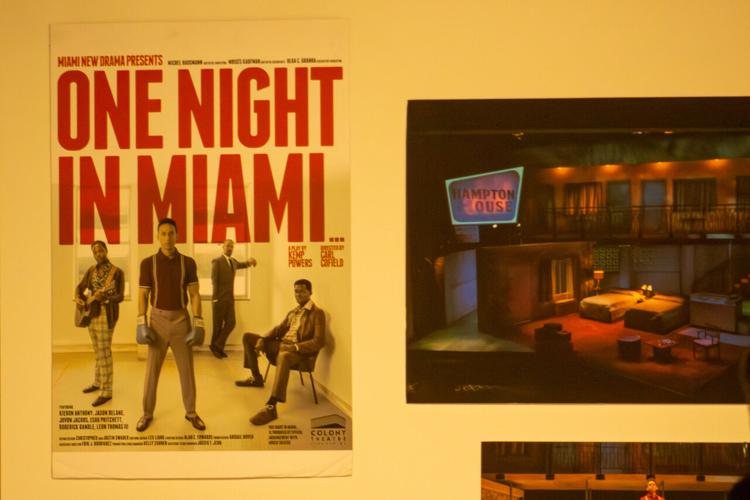
Regina King’s directorial debut, “One Night in Miami,” was partially filmed at the Historic Hampton House.
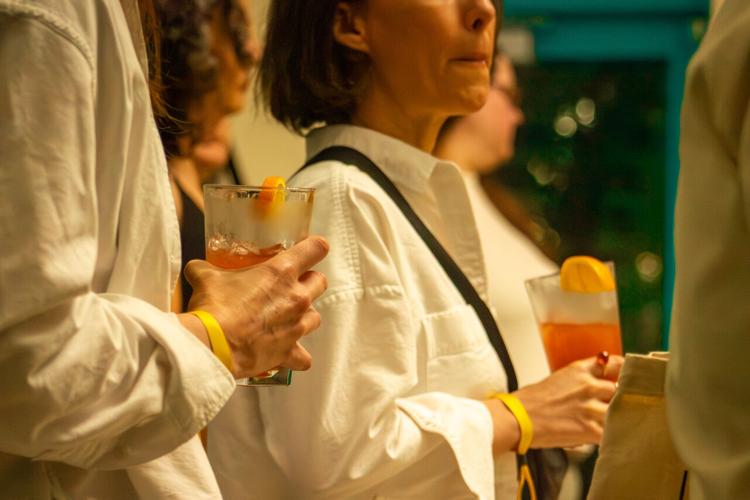
Before the tour, attendees were able to order from a curated cocktail menu and mingle in the former Hampton House Motel dining room.

Regina King’s directorial debut, “One Night in Miami,” was partially filmed at the Historic Hampton House.

Before the tour, attendees were able to order from a curated cocktail menu and mingle in the former Hampton House Motel dining room.

